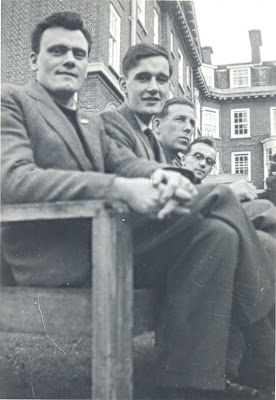
The Belfast-based "News Letter" is hosting a debate on the future of the Union in 2021, the 100th anniversary of the creation of Northern Ireland. My contribution to this series appeared in the paper on 13 October under the following title. Ian Paisley, Gerry Adams, Peter Robinson, David Trimble and Sir Reg Empey are amongst the previous contributers to the discussion. My article appears below -
COULD ECONOMIC CUTS HURT THE PEACE PROCESS?
Economic cuts could harm Northern Ireland's path to peace argues blogger and former Labour MP Harry Barnes.
Published Date: 13 October 2010
Although progress has not always been smooth since the time of the Belfast Agreement, Northern Ireland has moved into an era marked by relative peace and reconciliation.
One clear possibility for the coming decade is that this progress will continue and the conflicts of the past will be minimised.
A new generation given a favourable context will be capable of transcending past divisions.
Yet even given that we now live in a more mobile society, the social bonds of upbringing are likely to remain strong enough for most people to retain commitments to their respective unionist and republican backgrounds.
As the unionists are in the majority and the prospect of being surpassed via a higher Catholic birth rate declines, majority support for the Union should remain.
If a period of relative peace delivers sufficient prosperity, then increasing numbers of republican sympathisers are likely to give a de facto acceptance to the Union.
This is especially the case to the extent that cross-border links have been developed and seem likely to extend.
The above pattern is one that I would anticipate and find attractive.
Constitutionally Northern Ireland would remain in the Union, but economically and socially the island of Ireland would become more integrated.
There are, however, some stark economic circumstances which could disrupt such developments.
The coalition government is keen to cut Northern Ireland’s dependence on public services and its bill for welfare benefits.
So unless those dependent on these avenues of expenditure act in a common defence of their interests via bodies such as trade unions, then there is a danger that under deprivation both Catholic and Protestant communities might be used by extremists to turn against each other.
So efforts to see that Northern Ireland’s politicians reflect a common stance to protect the province’s social and economic well-being are also priorities.
There is also a danger that social and economic integration across the whole of the island of Ireland will be seriously hampered by the economic crisis which has hit the Republic.
I take it as a fact of life over the next ten years that there will be comfortable continuing majority support for the maintenance of the Union.
This does not, however, need a form of unionist political unity in the assembly nor at Westminster.
I have long been an advocate of the Labour Party coming to function fully in Northern Ireland whilst making moves to draw its support from both the unionist and republican traditions.
Yet I do not envisage a major breakthrough by Labour in Northern Ireland by 2021, although I would take what can be got.
It needs, however, to be recognised that the growth of Sinn Fein in Northern Ireland politics is itself likely to be seen by many unionists as a reason for their clubbing together.
This does not mean that outside of the constitutional objectives of both unionism and republicanism that common ground cannot be sought on issues such as housing, education, health services, benefits and employment.
When it comes to assembly elections in a democratic sense any winner (Sinn Fein or otherwise) is acceptable in providing a first minister.
Whether such a person is someone who is acceptable in the sense of being almost likeable seems to me to depend first of all on how committed they are to the process of peace and reconciliation.
It is then a matter of judging their economic and social programme. For me Sinn Fein and any another party needs to prove its worth according to its practices.
Harry Barnes was Labour MP for North East Derbyshire from 1987-2005, during which time he served on the Northern Ireland Select Committee, the British-Irish Parliamentary Body, was joint-president of New Dialogue and worked with the Peace Train. His political blog is at http://threescoreyearsandten. blogspot.com/

